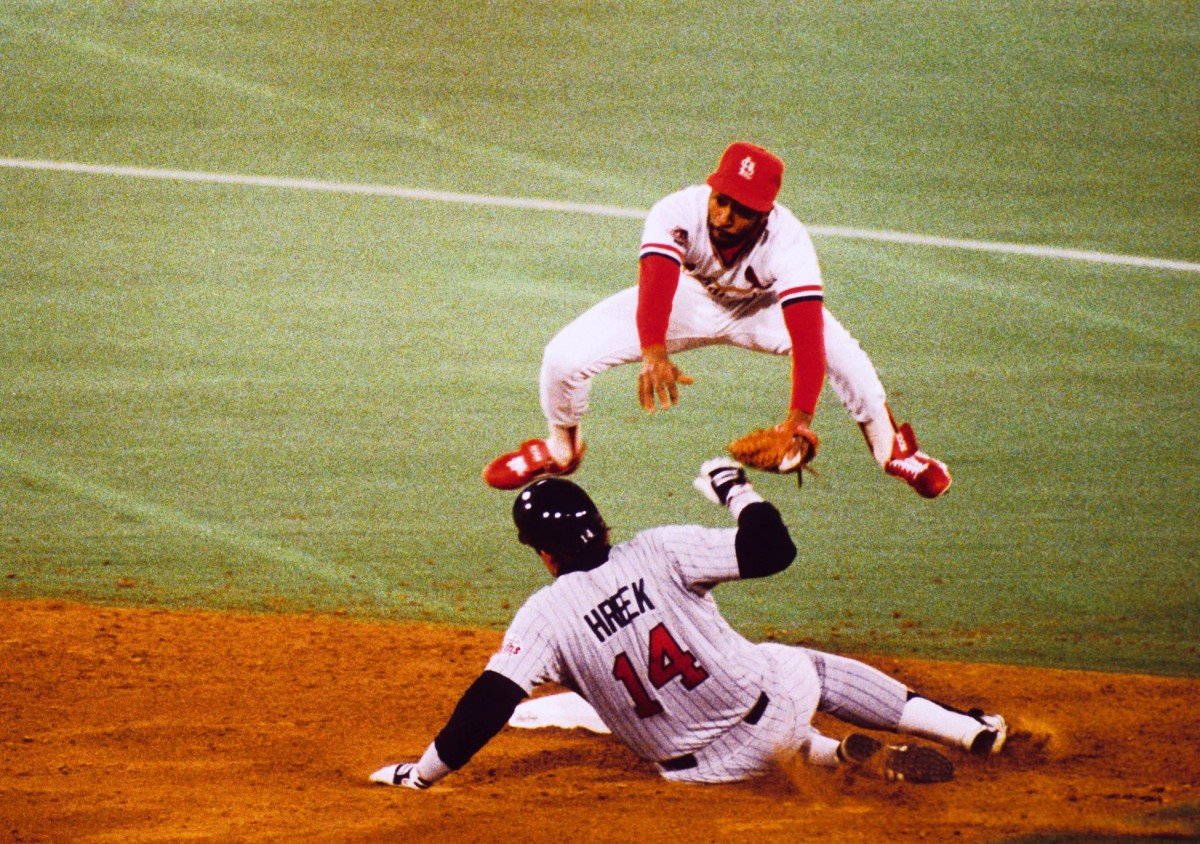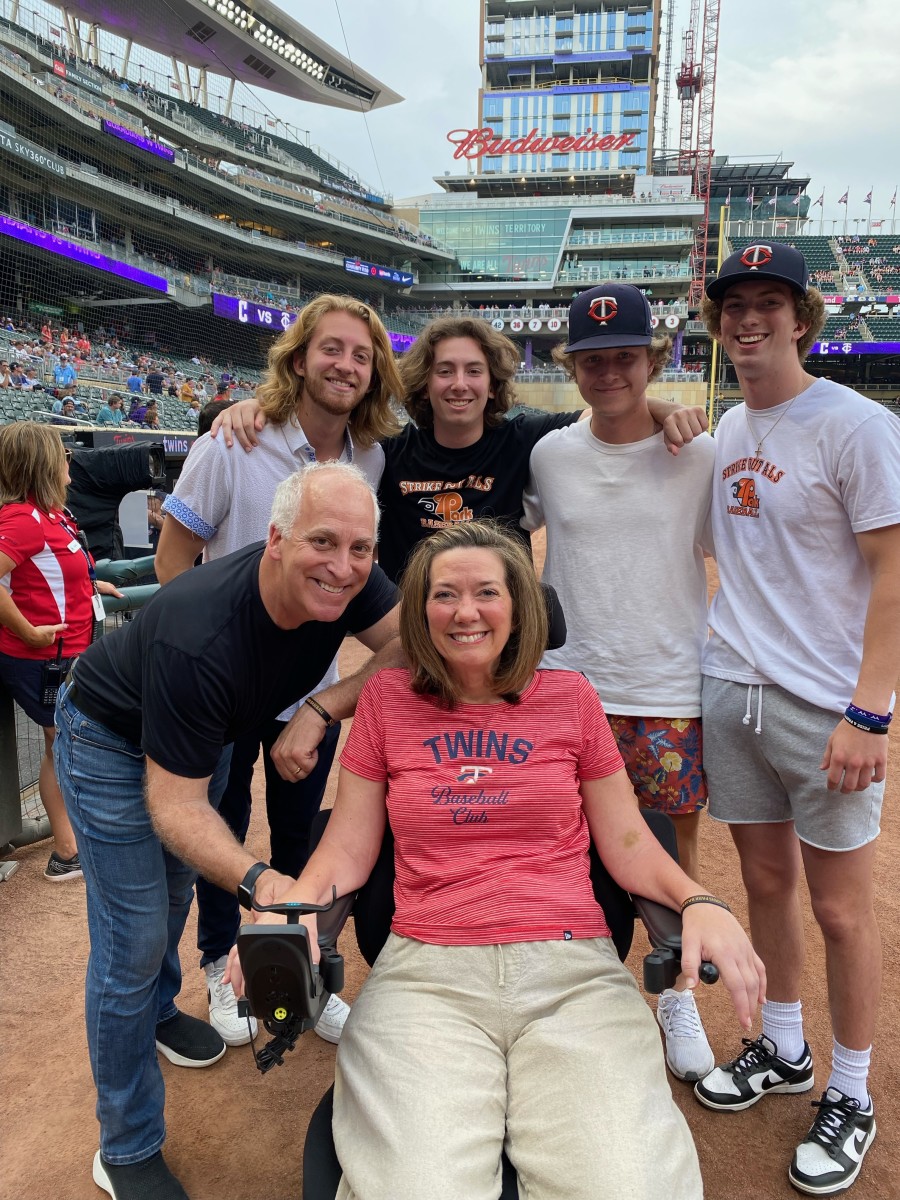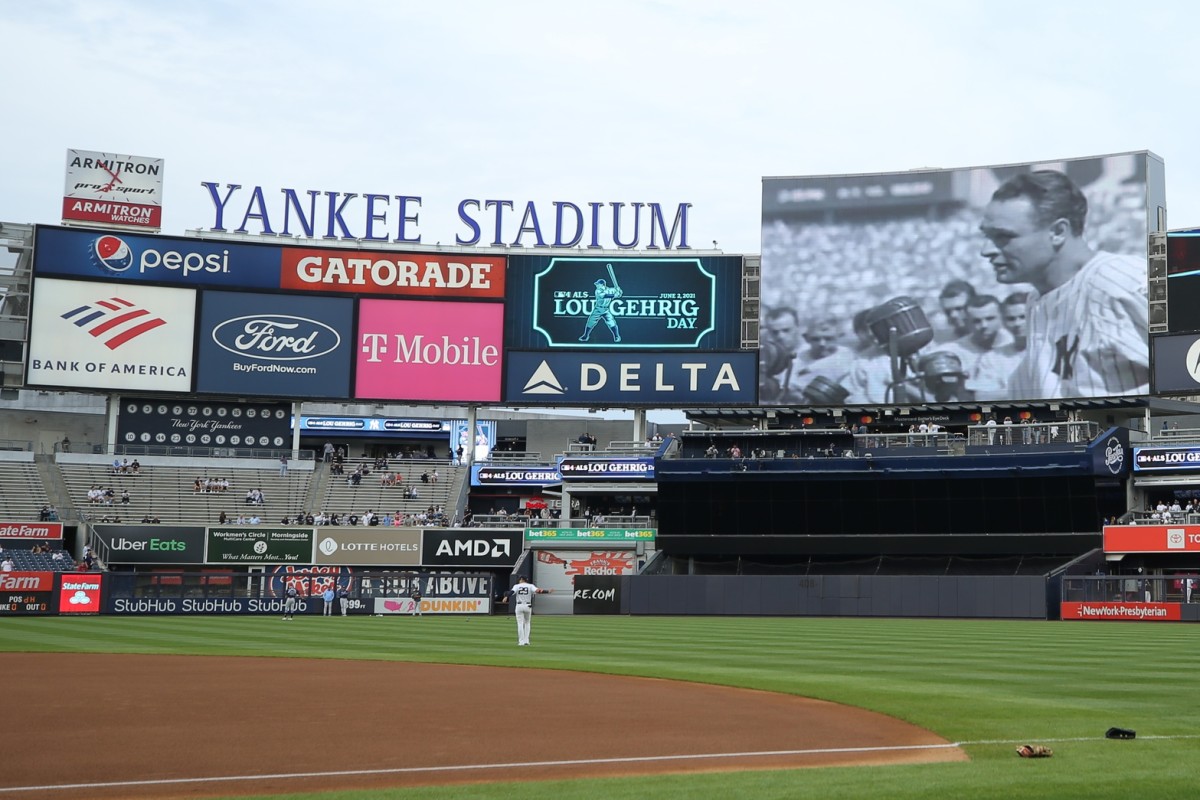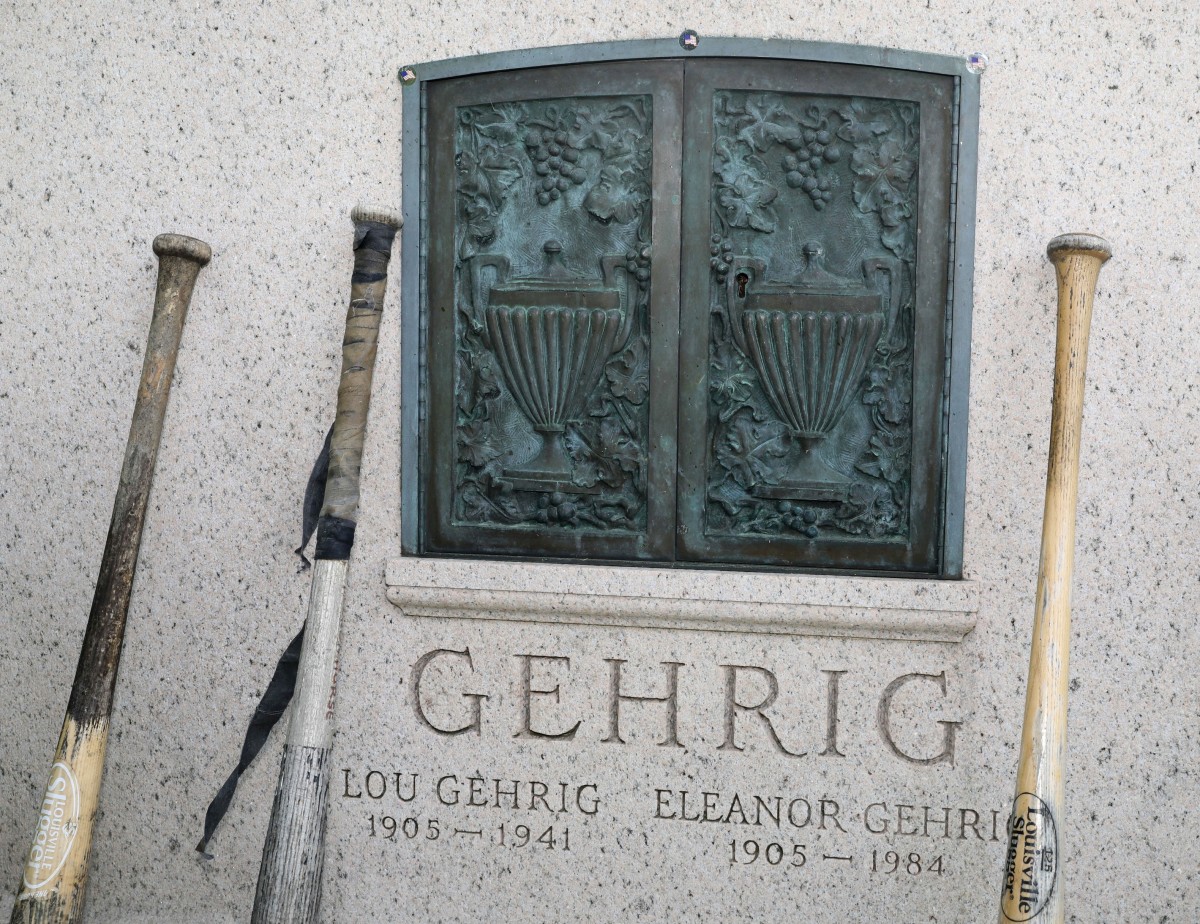Brian Murphy: A day to remember, an American hero and the ongoing fight

Kent Hrbek was only 22 when he became an everyday player for the Twins in 1982, fulfilling a dream the slugging first baseman shared with his father, Ed, growing up in the shadow of Metropolitan Stadium in Bloomington.
Sadly, the old man did not survive his son’s sensational rookie season.
He was cut down at 52 by insidious and uncompromising amyotrophic lateral sclerosis (ALS).
The same disease that ended Lou Gehrig’s iron man streak in 1939 and his life two years later, forever linking one of baseball’s original superstars to the fatal disorder that continues to ravage victims and stymie scientists trying to slay the great killer.
Ed never saw Hrbek become a World Series hero in 1987 with a Game 6 grand slam against the Cardinals at the Metrodome.
Or watch him become the devil down in Georgia for helping Atlanta’s Ron Gant off the bag during Minnesota’s 1991 title run.

Hrbek retired at 34. Ed only stopped working for the gas company after he was diagnosed in May 1981. He died a year later.
“My father never enjoyed a day of retirement,” Hrbek recalled Friday. “That’s one of the reasons I retired early. He was excited as heck to see his son make it to the major leagues, but it was a trying time for me as I was just breaking in.
“He sat me down one day and told me to keep playing, take care of mom and have fun.”
Fond memories and what might have been fuel Hrbek’s relentless drive to raise awareness and money to research a cure for the same disease that killed Gehrig eight decades ago.
Fishing for a cure
Hrbek and his fellow Minnesotans, former Oakland A’s and Twins catcher Terry Steinbach and ex-University of Minnesota-Duluth hockey star Jimmy Johnson, are hosting their 28th annual fishing tournament Saturday on Island Lake near Duluth.
The tournament has raised more than $4 million for ALS research and funds to help patients and their families manage worsening symptoms. It is the summer companion to a winter snowmobile race that Hrbek’s partners have been sponsoring for over 20 years.
“It’s still pretty much a death sentence when the doctor tells you that you have ALS,” Hrbek said. “Within the last couple years, there is hope with drugs that have helped prolong life spans from 5 to 7 years.
“Progress is helping families cope with it, supporting programs, advanced wheelchairs and communications tools to help them live the life they have.”
‘Busy living, not dying’
Lynn Giovannelli is living with ALS, not waiting to die from it. She was honored Friday night before the Twins’ game against the Cleveland Guardians at Target Field.
Giovannelli and her husband, Gino, and their adult sons Stefano, Marco and Luca, watched at home plate a video the team produced on the board, showcasing Lynn’s battle and triumph of spirit.
The Twins also donated $10,000 to the ALS Association of Minnesota, North Dakota and South Dakota.
Stefano, whose senior season as a pitcher for St. Louis Park High ended with hip surgery in April, was back in form to throw out the first pitch. The lefty fired a bullet to TC Bear. The family received a warm ovation. Lynn smiled to the crowd as her wheelchair was rolled off the field.
“You can get busy dying or get busy living. We are living,” Giovannelli said during an interview, her whispered voice amplified by a headset and speaker.

Giovannelli, who was diagnosed in July 2020, credits her strong faith with providing the guidance and perspective to live out her days to full potential.
“I know where I’m going. I believe we’re all headed the same place,” she said. “This is unfortunate. This is sooner than I want. But I’ve had a great life. I have a great family. This disease has actually drawn us closer, if that is even possible.
“We are seizing every opportunity to do things that are full of joy, full of community, full of family. Yes, it is harder. It is getting harder. But we are not stopping.”
Three months after her diagnosis, the Giovannellis renewed their 1994 wedding vows. In November, the family traveled to Tuscany, Italy, for the vacation of a lifetime, although it was hardly wheelchair-friendly.
“That’s just an example of doing things because you can,” said Gino. “And you’ve got to get it in because … you’ve got to get it in.”
The Twins also honored Kurt Barnick, of Roseville, who was diagnosed with ALS in January 2022. A year later he could no longer walk. But it did not stop Barnick and his wife, Anna, from raising the Twins Territory flag before the game.
Honoring a legend
The celebration of life was part of Major League Baseball’s second annual Lou Gehrig Day.
At every ballpark hosting a game Friday night, Gehrig was remembered for his hall of fame career and the grace he displayed declaring himself “the luckiest man on the face of the earth” during an emotional speech at Yankee Stadium on July 4, 1939, mere weeks after his diagnosis at the Mayo Clinic in Rochester, Minn.
“I might have had a bad break, but I have an awful lot to live for,” Gehrig told a capacity crowd at baseball’s original cathedral – his echoing words preserved in the grainy black-and-white psyche of cultural history.

“I saw strong men weep this afternoon,” legendary columnist Shirley Povich of The Washington Post wrote that day.
Friday’s date, June 2, closed the circle on Gehrig’s remarkable career and life.
On that day in 1925, at Detroit’s Navin Field, Gehrig replaced Wally Pipp at first base for the Yankees and stayed in the Bronx Bombers lineup for 14 years – a consecutive game streak of 2,130 that earned Gehrig the nickname, “The Iron Horse.”
Sixteen years later, Gehrig died at his home in suburban New York City on June 2, 1941. He was just 37.
On Sept. 6, 1995, Baltimore Orioles shortstop Cal Ripken famously surpassed Gehrig, renewing interest in Gehrig’s career and the disease Americans largely associate with him.
The Minnesota connection
ALS was first identified by a French physician in 1874, but few people had ever heard of the debilitating neurological and muscular disorder until Gehrig was diagnosed.
The lifetime .340 hitter, who also slugged 493 home runs and bagged 1,995 RBIs playing in the shadow of otherworldly teammate Babe Ruth, started feeling weakness and numbness in his fingers and arms early in the 1939 season.
He played only eight games, including his last on April 30, managing four mere singles in 28 at bats.
That June, he visited the Mayo Clinic, the sprawling campus of global specialists in southeast Minnesota that catered to the rich, famous and diseased.
According to Jonathan Eig’s masterful biography -- “Luckiest Man: The Life and Death of Lou Gehrig” – his unexpected arrival in Rochester from the Big Apple was a sensation.
The moment he arrived on a Northwest Airlines prop plane, carrying a Saturday Evening Post magazine, Gehrig hitched a ride with Rochester Post-Bulletin reporter Joe Kernan to the Kahler Hotel.
Doctors who examined Gehrig immediately recognized the muscle atrophy, wasting and twitching. He spent a week at Mayo being run through a battery of tests that confirmed the fatal news.
Gehrig managed to keep a cheerful attitude as the town welcomed its celebrity guest, uncertain why he was even there.
He visited former teammate Julie Wera, a third baseman who blew out his knee during the 1927 season – when the Yankees dominated baseball and swept their way to the second of 27 World Series titles.
Wera returned to his hometown and was working as a butcher at the Piggly Wiggly in Rochester.
Gehrig also sat for an hour with a couple of 10-year-olds who knocked on his hotel door for an interview for their neighborhood paper.
He showed Little Leaguers how to swing and watched their teams play on mosquito-infested sandlots. He also visited a Boy Scout camp and took an overnight cruise on Lake Pepin.
By the time he returned to New York in late June, the world knew Gehrig’s baseball days were over. Less than two years after his famous speech, he was gone.
But not forgotten.
‘It better resonate’
Gehrig may be more renowned for the disease that killed him than the ballplayer whose career ended 84 years ago.
His legacy still resonates, according to Cleveland manager Terry Francona, a championship manager, baseball lifer and grand storyteller.
“It better resonate,” said Francona. “If it doesn’t resonate, something’s wrong with you.”
Moments before his pregame interviews, Francona watched a replay of Gehrig’s “luckiest man” speech on his office television.
“It’s tragic, though,” he said about ALS. “We’re in a place where we can’t figure out it. Hopefully soon.”
It is the irony of ironies that a withering disease of weakness ended the life of a man known for his iron strength.
And that not much has changed since 1941, but for more mobile wheelchairs and voice technologies that grant Lynn Giovannelli some quality of life.
She remains hopeful a cure will be found during her children’s lifetime, if not hers, punctuating her message with the mother of all challenges.
“Do your part,” Giovannelli says. “For research. For fundraising. For advocacy. Get off the bench. Get involved.
“We all have to do our part to end this f****** disease.”

